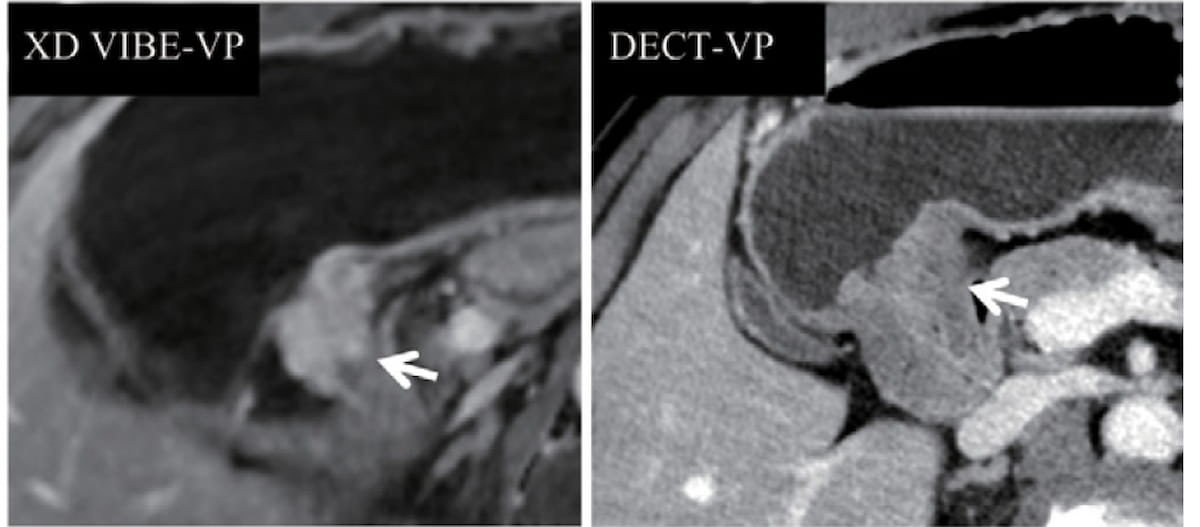For preoperative T and N staging of gastric most cancers, multiparametric magnetic resonance imaging (mpMRI) presents a better diploma of accuracy than dual-energy computed tomography (DECT) no matter radiologist expertise, in response to new comparative analysis.
For the potential examine, just lately revealed in Radiology, researchers in contrast mpMRI and dual-phase DECT in a cohort of 202 sufferers (imply age of 62) with gastric most cancers. For dual-phase DECT, the researchers utilized 40 keV reconstructions in addition to 120 kVp-like photos whereas mpMRI imaging included T2-weighted photos, zoomed diffusion-weighted imaging (DWI) and volumetric dynamic contrast-enhanced MRI, in response to the examine. The examine authors added that six reviewing radiologists of various expertise ranges took a 30-case coaching course previous to the examine.
Whereas the researchers famous equally excessive charges of inter-reader settlement for mpMRI and DECT for each T and N staging for gastric most cancers, they discovered larger ranges of accuracy for mpMRI in T staging (61 to 77 % vs. 50 to 64 %). The usage of mpMRI additionally led to a 54 to 68 % vary of accuracy for mpMRI in N staging vs. a 51 to 58 % vary for DECT, in response to the examine authors.
For a pT3NOMO tumor in a 58-year-old lady, DECT (proper) confirmed an unclear margin between the tumor and the usually thickened gastric antrum wall. Nonetheless, the XD-VIBE MRI (left) revealed notable enhancement and thickening of the antrum, facilitating right staging by 5 of the six reviewing radiologists within the examine. (Photographs courtesy of Radiology.)

“Our pairwise comparisons demonstrated the prevalence of mpMRI over DECT in evaluating the local-regional T and N stage. Relating to the depth of tumor invasion, the accuracy was larger for mpMRI than for DECT — an evaluation that was reproducible throughout three teams of readers with completely different ranges of expertise,” wrote lead examine creator Qiong Li, M.S., who’s affiliated with the Division of Radiology on the First Affiliated Hospital with Nanjing Medical College in Nanjing, China, and colleagues.
The examine authors famous the superior accuracy with mpMRI was significantly evident with T1 (83 % vs. 65 % for DECT) and T4 tumor staging (78 % vs. 68 %). Multiparametric MRI additionally demonstrated 17 % larger accuracy for N1 staging (41 % vs. 24 %) and a 19 % larger accuracy for N3 staging (64 % vs. 45 %).
“The upper accuracy of mpMRI for figuring out the N stage in our examine is likely to be defined by the truth that morphologic options, together with nodal dimension, margin, and sign depth on T2-weighted, zoomed DWI, and XD-VIBE DCE photos, had been included into the interpretation of local-regional lymph node involvement,” famous Li and colleagues.
Three Key Takeaways
1. Greater accuracy of mpMRI for T and N staging. Multiparametric MRI (mpMRI) demonstrated larger accuracy in comparison with dual-energy computed tomography (DECT) for each T staging (61-77 % vs. 50-64 %) and N staging (54-68 % vs. 51-58 %) of gastric most cancers, no matter the radiologist’s expertise degree.
2. Superior efficiency in particular tumor phases. The examine highlighted that mpMRI confirmed significantly larger accuracy in T1 (83 % vs. 65 %) and T4 tumor staging (78 % vs. 68 %), in addition to N1 (41 % vs. 24 %) and N3 staging (64 % vs. 45 %), in comparison with DECT.
3. Medical relevance: Correct T and N staging with mpMRI can considerably influence therapy selections, doubtlessly permitting sufferers with T1 N0 tumors to keep away from neoadjuvant remedy and its related toxicity, and stopping pointless surgical procedure in sufferers with unresectable T4 tumors.
In an accompanying editorial, Ramiro J. Mendez, M.D., and Susana Martin-Garre, M.D., Ph.D., mentioned there isn’t a at present no consensus with respect to the utility of MRI being superior for gastric most cancers staging, and famous “extremely variable” sensitivity and specificity charges reported for a number of imaging modalities, together with MRI, for N staging.
Nonetheless, Drs. Mendez and Martin-Garre mentioned the findings of the present examine indicating larger MRI accuracy in staging T1, T4a, N1 and N3 gastric most cancers tumors are promising.
“These findings might have explicit medical relevance as sufferers with T1 N0 tumors could also be handled with surgical procedure with out neoadjuvant remedy, avoiding the danger of toxicity. Exact T and N staging of regionally superior gastric tumors would additionally forestall pointless surgical procedure in sufferers with unresectable T4 tumors,” identified Dr. Mendez, the chief of belly radiology at Hospital Clinico San Carlos in Madrid, Spain, and Dr. Martin-Garre, an affiliate professor of radiology at Universidad Complutense de Madrid in Madrid, Spain.
(Editor’s observe: For associated content material, see “Computed Tomography Insights on GI Bleeding: 9 Takeaways from New Consensus Suggestions,” “Radiotherapy for Prostate Most cancers: Research Says MRI Steerage Considerably Reduces GU and GI Toxicities” and “Might Photon Counting CT Supplant MRI for Imaging Evaluation of Hepatic Steatosis?”)
In regard to review limitations, the authors conceded the probabilities of affected person choice bias, as a consequence of limiting the cohort to sufferers who had surgical procedure with healing intent, and recall bias, which can have resulted from a two-week interval between readings. Noting restricted expertise with endoscopic ultrasound at their establishment, the researchers mentioned they accordingly didn’t examine mpMRI to endoscopic ultrasound within the examine.

